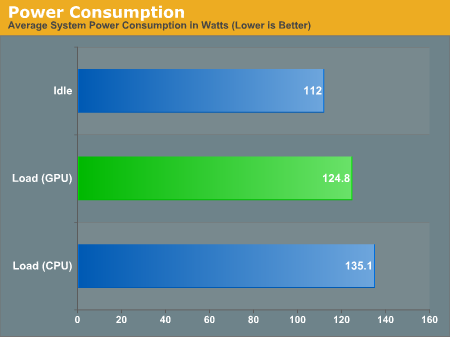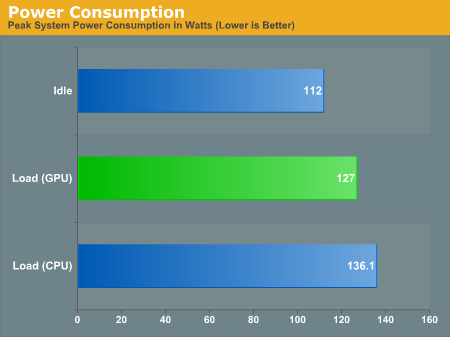NVIDIA GeForce 8600: Full H.264 Decode Acceleration
by Anand Lal Shimpi on April 27, 2007 4:34 PM EST- Posted in
- GPUs
Power Consumption
The reason that a handful of execution engines within a $150 graphics card can be faster than even some of the most powerful desktop microprocessors is because of the use of specialized logic designed specifically for the task at hand. NVIDIA took this approach to an even greater degree by effectively making its BSP engine useful for exactly one thing: CAVLC/CABAC bitstream decoding for H.264 encoded content. Needless to say, NVIDIA's approach is not only faster than the general purpose microprocessor approach, but it should also be more power efficient.
To measure the improvement in power efficiency, we outfitted our test bed with a GeForce 8600 GT and ran the Yozakura benchmark with hardware acceleration enabled and disabled. With it enabled, the 8600 GT is handling 100% of the H.264 decode process; with it disabled the host CPU (an Intel Core 2 Duo E6320) is responsible for decoding the video stream. We measured total system power consumption at the wall outlet and reported the average and max values in Watts.

At idle, our test bed consumed 112W and when decoding the most stressful H.264 encoded HD-DVD we've got the power jumped up to 124.8W. Relying on the CPU alone to handle the decoding required 8% more power, bringing the average system power usage up to 135.1W.

Surprisingly enough, the difference in power consumption isn't as great as we'd expect. Obviously system performance is a completely different story as the 8600's hardware acceleration makes multitasking while watching H.264 content actually feasible, but these numbers show the strength of Intel's 65nm manufacturing process. We do wonder what the power consumption difference would look like if a CPU manufacturer was able to produce a CPU and a GPU on the very same process. With AMD's acquisition of ATI, we may very well know the answer to that question in the coming years.










64 Comments
View All Comments
Anand Lal Shimpi - Friday, April 27, 2007 - link
I corrected the statement, we will have our 8500 review sample in the coming weeks :)Take care,
Anand
kilkennycat - Friday, April 27, 2007 - link
Anand, you need to keep an eye on both ZZF and Newegg on release dates for new computer hardware, just in case your review versions don't materialize. The MSI 8500GT (o/c version, irc) was orderable and In Stock at ZZF @10PM Pacific Time on April 16 and continued to be in stock for at least part of April 17.JarredWalton - Saturday, April 28, 2007 - link
We know they're available, but if we ran out and purchased every piece of new hardware for testing rather than relying on our partners, that can start to put a pretty sizable dent in the old paycheck. Not that we don't often purchase hardware anyway....mmp121 - Friday, April 27, 2007 - link
Page 3 paragraph 1, last sentence ends abruptly.Could you comment on what you are confirming?
Anand Lal Shimpi - Friday, April 27, 2007 - link
Just confirming that the two 8600s perform the same despite their differences. Thanks for the correction :)Take care,
Anand
WarlordBB - Friday, April 27, 2007 - link
Did I miss it, or did you mention it in a previous article?What the heck are you using for your HD-DVD drive?
mmp121 - Friday, April 27, 2007 - link
Most likely the XBOX360 HD-DVD drive. Or heck, maybe he ripped it to HDD?Anand Lal Shimpi - Friday, April 27, 2007 - link
We used the Xbox 360 HD-DVD drive. We would never rip a HD-DVD movie to HDD, that would be illegal of course ;)DerekWilson - Friday, April 27, 2007 - link
quite ... of course, inspite of the fact that ripping the HD or BD movie is illegal (DMCA violation), *having* the HD or BD movie on your HDD is protected by fair use ...as Anand alluded to, though, playing back content that isn't aacs protected would result in lower cpu utilization and wouldn't be reflective of the average consumer experience.
Ard - Friday, April 27, 2007 - link
Well, strictly speaking that's not exactly true. Having a ripped movie on your HDD, assuming you legally own the movie in question, is certainly a fair use due to the software archival provisions in the Copyright Act. However, since the DMCA is itself a part of the Act, having the movie on your HDD essentially becomes de facto illegal because the only way you could put it there is through ripping, which, as you stated, is illegal anti-circumvention. It's things like this (the chilling of fair use and extension of copyright owners' rights) that make me hate the DMCA and all who would use it for their gain.On topic, I'm glad to see that the 8600 line is capable of significantly decreasing CPU utilization. I wasn't expecting a drop from 80+% to 24%. It's really incredible.